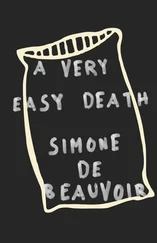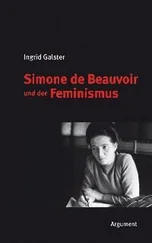She answered me in well-balanced phrases—I could sense that they had been carefully prepared. The book was an excellent synthesis, it clarified various obscurities; it was valuable in emphasizing what was new in my work.
‘But in itself, does it say anything new?’
‘That was not its intention.’
‘It was mine.’
She grew confused: I went on and on, I badgered her. As she saw it I had already, in my earlier books, applied the methods I was now putting forward; indeed, in many places I had spoken of them quite explicitly. No, I was producing nothing new. As Pélissier had said, the book was rather a well-based restatement and summing up.
‘I had meant to do something quite different.’
I was both stunned and unbelieving, as it often happens when a piece of bad news hits one. The unanimity of the verdict was overwhelming. And yet still I said to myself, ‘I cannot have been so wholly wrong as all that.’
We were having dinner in a garden just outside Paris, and I made a great effort to hide my mortification. In the end I said, ‘I wonder whether one’s not condemned to repetition once one has passed sixty.’
‘What a notion!’
‘There are plenty of painters, composers, and even philosophers who have done their very best work in their old age; but can you tell me of a single writer?’
‘Victor Hugo.’
‘All right. But who else? Montesquieu virtually came to an end at fifty-nine with L’Esprit des Lois , which he had had in his mind for years and years.’
‘There must be others.’
‘But not one of them springs to mind.’
‘Come! You mustn’t lose heart,’ said Martine reproachfully. ‘Any body of work has its ups and its downs. This time you have not fully succeeded in what you set out to do: you will have another go.’
‘Usually my failures spur me on. This time it’s different.’
‘I don’t see how.’
‘Because of my age. André says that scientists are finished well before they are fifty. In writing too no doubt there comes a stage at which one only marks time.’
‘In writing I’m sure that’s not so,’ said Martine.
‘And in science?’
‘There I’m not qualified to form an opinion.’
I could see André’s face again. Had he felt the same kind of disappointment that I was feeling? Once and for all? Or time after time? ‘You have scientists among your friends. What do they think of André?’
‘That he’s a great scientist.’
‘But what is their opinion of what he’s doing at present?’
‘That he has a fine team and that their work is very important.’
‘He says all the fresh ideas come from the men who work with him.’
’That may well be. It seems that scientists only make discoveries in the prime of life. Nearly all the Nobel prizes for science go to young men.’
I sighed. ‘So André was right, then. He’ll not discover anything any more.’
‘One has no right to make up one’s mind about the future in advance,’ said Martine, with an abrupt change of tone. ‘After all, nothing exists except for particular instances. Generalities do not prove anything.’
‘I should like to believe it,’ I said, and began to talk of other things.
As she left me, Martine said hesitantly, ‘I’m going back to your book. I read it too quickly.’
‘You read it, all right, and it doesn’t come off. But as you say, it’s not very important.’
‘Not at all important. I’m quite certain you will still write a great many very good books.’ I was almost certain that this was not the case, but I did not contradict her. ‘You are so young!’ she added.
People often tell me that and I feel flattered. All at once the remark irritated me. It is an equivocal compliment and one that foretells a disagreeable future. Remaining young means retaining lively energy, cheerfulness and vitality of mind. So the fate of old age is the dull daily round, gloom and dotage. I am not young: I am well preserved, which is quite different. Well preserved; and maybe finished and done with. I took some sleeping-pills and went to bed.
When I woke up I was in a very curious state—more feverish than anxious. I stopped telephone calls coming through and set about re-reading my Rousseau and Montesquieu. I read for ten hours on end, scarcely breaking off to eat a couple of hard-boiled eggs and a slice of ham. It was an odd experience, this bringing to life of pages born of my pen and forgotten. From time to time they interested me—they surprised me as much as if someone else had written them; yet I recognized the vocabulary, the shape of the sentences, the drive, the elliptical forms, the manner- isms. These pages were soaked through and through with myself—there was a sickening intimacy about it, like the smell of a bedroom in which one has been shut up too long. I forced myself to go for a stroll and to dine at the little restaurant nearby: home again I gulped down very strong coffee and I opened this present book. It was all there in my mind, and I knew beforehand what the result of the comparison would be. Everything I had to say had been said in my two monographs. I was doing no more than repeating, in another form, those ideas that had given the monographs their interest. I had deceived myself when I thought I was going on to something new. And what was worse, when my methods were separated from the particular contexts to which I had applied them, they lost their acuity and suppleness. I had produced nothing new: absolutely nothing. And I knew that the second volume would only prolong this stagnation. There it was, then: I had spent three years writing a useless book. Not just a failure, like some others, in which in spite of awkwardness and blunders I did open up certain fresh views. Useless. Only fit for burning.
Do not make up your mind about the future in advance. Easy enough to say. I could see the future. It stretched away in front of me, flat, bare, running on out of sight. Never a plan, never a wish. I should write no more. Then what should I do? What an emptiness within me—all around me. Useless. The Greeks called their old people hornets. ‘Useless hornet,’ Hecuba called herself in The Trojan Women. That was my case. I was shattered. I wondered how people managed to go on living when there was nothing to be hoped for from within.
Out of pride I did not choose to leave any earlier than the fixed date and I did not say anything to André on the telephone. But how long those three days that followed seemed to me! Discs enclosed in their bright-coloured sleeves, books right-packed on their shelves: neither music nor words could do anything for me. Formerly I had looked to them for stimulus or relaxation. Now they were no more than a diversion whose irrelevance sickened me. See an exhibition, go back to the Louvre? I had so longed to have the leisure to do so in the days when I did not: possess it. But if ten days ago all I could see in the churches and chateaux was heaped-up stones, it would be even worse now. Nothing would come over from the canvas to me. For me the pictures would merely be cloth with colours squeezed on from a tube and spread with a brush. Walking bored me: I had already discovered that. My friends were away on holiday and in any case I wanted neither their sincerity nor their falsehoods. Philippe—how I regretted him, and how painfully! I thrust his image aside: it made my eyes fill with tears.
So I stayed at home, brooding. It was very hot, and even if I lowered the sun-blinds I stifled. Time stopped flowing. It is dreadful—I feel like saying it is unfair—that it should be able to go by both so quickly and so slow. I was walking through the gates of the lycée at Bourg, almost as young as my own pupils, gazing with pity at the old grey-haired teachers. Flash, and I was an old teacher myself; and then the lycée gates closed behind me. For years and years my pupils gave me the illusion that my age did not alter: at the beginning of each school year I found them there again, as young as ever; and I adapted myself to this unchanging state. In the great sea of time I was a rock beaten by waves that were continually renewed—a rock that neither moved nor crumbled. And all at once the tide was carrying me away, and would go on carrying me until I ran aground in death. My life was hurrying, racing tragically towards its end. And yet at the same time it was dripping so slowly, so very slowly now, hour by hour, minute by minute. One always has to wait until the sugar melts, the memory dies, the wound scars over, the sun sets, the unhappiness lifts and fades away. Strange anomaly of these two rhythms. My days fly galloping from me; yet the long dragging out of each one makes me weary, weary.
Читать дальше












